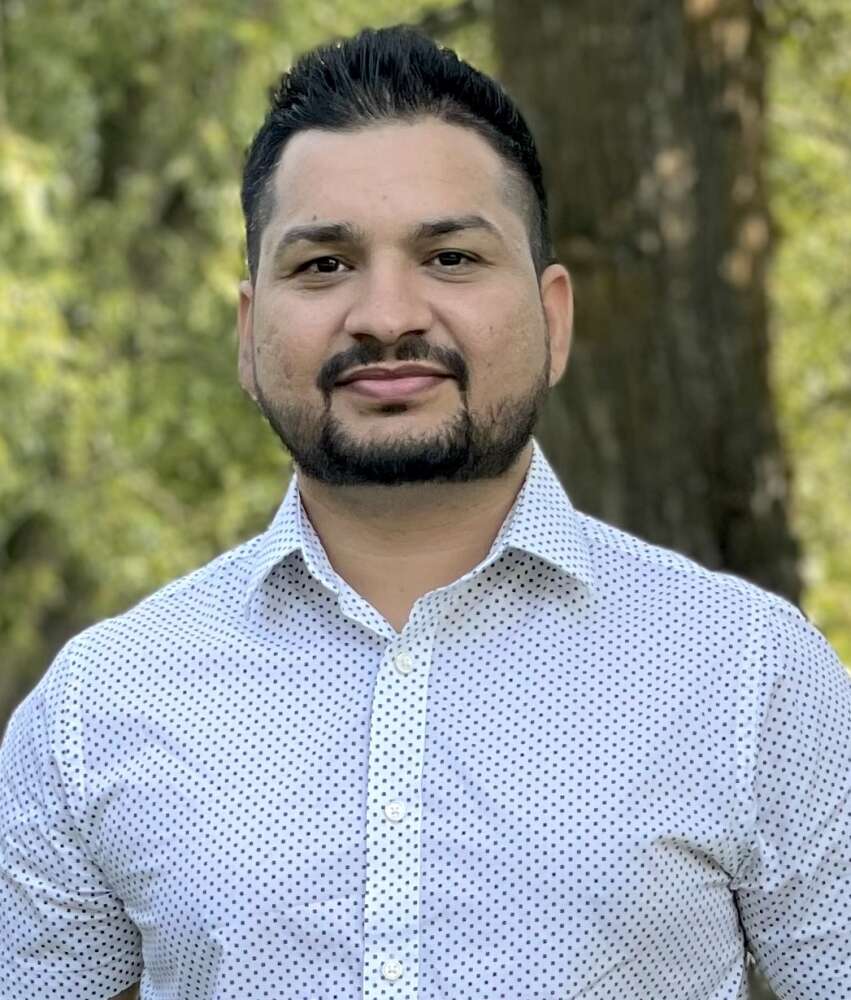Four emerging scholars have been offered Banting Postdoctoral Fellowships at U of G. Named for Dr. Frederick Banting, the Canadian medical scientist and Nobel laureate who helped discover insulin, these awards are the Government of Canada’s most prestigious post-doctoral fellowships, valued at $70,000 annually for two years.
In total, 70 Banting Fellowships were provided to researchers across Canada this year. The awards are funded by the Social Sciences and Humanities Research Council, the Canadian Institutes of Health Research and the Natural Sciences and Engineering Research Council.
Food insecurity, honeybee decline and social vulnerability to climate change are the research topics of Dr. Jade Da Costa, Dr. Brendan Daisley and Dr. Nasir Khan, the three scholars who will take up their fellowships at the University of Guelph this academic year.
“It is a testament to the reputation of the University of Guelph and the research strength of our faculty in the food-health-environment nexus that these outstanding early-career scholars have chosen to further their training with us,” said Dr. Ben Bradshaw, assistant vice-president (graduate and post-doctoral studies). “Recognition of their research promise and a record four Banting post-doctoral fellowships for the University of Guelph are surely reason to celebrate as we kick off a new academic year.”
Dr. Jade Crimson Rose Da Costa

Dr. Jade Crimson Rose Da Costa will work alongside food justice activists and community service providers to develop practical strategies to address hunger among Indigenous and racialized people, who have experienced a significant rise in food insecurity since the start of the COVID-19 pandemic.
The project grows out of Da Costa’s involvement with The People’s Pantry, a regional mutual aid group that they helped co-found in the Greater Toronto–Hamilton area. The grassroots organization provides free home-cooked meals and grocery care packages to communities struggling with food insecurity.
Da Costa will work with Dr. Carla Rice, a professor in the Department of Family Relations and Applied Nutrition in the College of Social and Applied Human Sciences and director of U of G’s Re·Vision Centre.
“I chose Guelph because of Carla, who introduced me to the digital storytelling methodologies I’ll be using,” said Da Costa. “But also, Guelph is Canada’s Food University, which means there are resources here — on food production, food justice, social science approaches to food — that can’t be found at many other schools.”
Da Costa holds a PhD in sociology from York University and an MA in sociology from Western University, where they also earned a BA in sociology and English language and literature.
Dr. Brendan Daisley

“Our bee populations are experiencing unsustainable mortality rates from the combined effects of infectious disease, agrochemical exposure and habitat loss, especially due to climate change,” said Dr. Brendan Daisley. “While the latter can only be addressed by systemic change, my research aims to help honeybees tackle issues of disease and toxicity.”
Working in the lab of Dr. Emma Allen-Vercoe, a professor in the Department of Molecular and Cellular Biology in the College of Biological Science, Daisley will study the honeybee microbiome, the community of microbes that contribute to the bees’ health and resilience.
Beneficial microbes have been proven to help health outcomes in humans, but their role in honeybee health has been understudied, he said. He will explore how microbes might be used therapeutically to help honeybees combat disease and counteract the harmful effects of pesticides and other chemicals.
Daisley also played a key role in the recent launch of The Canadian Bee Gut Project, which crowdsources honeybee samples from beekeepers across Canada to catalogue bee-associated microbes. The data will be used to determine the connection between specific microbial fingerprints and bee health, he said.
Daisley holds a PhD in microbiology and immunology and a BSc in biology from Western University.
Dr. Nasir Khan

Dr. Nasir Khan will explore how vulnerability to climate change impacts food security, prosperity and resilience of rural households in Pakistan, focusing on the Kammis, a landless, lower-status caste.
The Kammis have historically been provided food and financial aid by the rural elite they served. Recent socioeconomic changes have pushed the Kammis to look for alternative livelihoods. Many have turned to farming on rented land despite having little practical experience with agriculture.
“Pakistan is susceptible to climate-induced disaster like floods, droughts and heatwaves,” said Khan, whose previous research focused on the role of government in climate change and disaster risk management. “The rural caste system is a distinctive aspect of South Asian culture, and I am interested in seeing how it might contribute to an already vulnerable situation.”
This study will extend scholarship about social inequality and climate change, he said.
Khan completed his PhD in rural development from the China Agricultural University, Beijing and holds a master’s in agricultural extension from the University of Agriculture Faisalabad, Pakistan.
He will work with Dr. Ataharul Chowdhury, a professor in the School of Environmental Design and Rural Development in the Ontario Agricultural College, who is also supervising 2022 Banting Postdoctoral Fellow Dr. Khondokar Kabir.
A fourth awardee declined the award to continue professional employment with the federal government.
